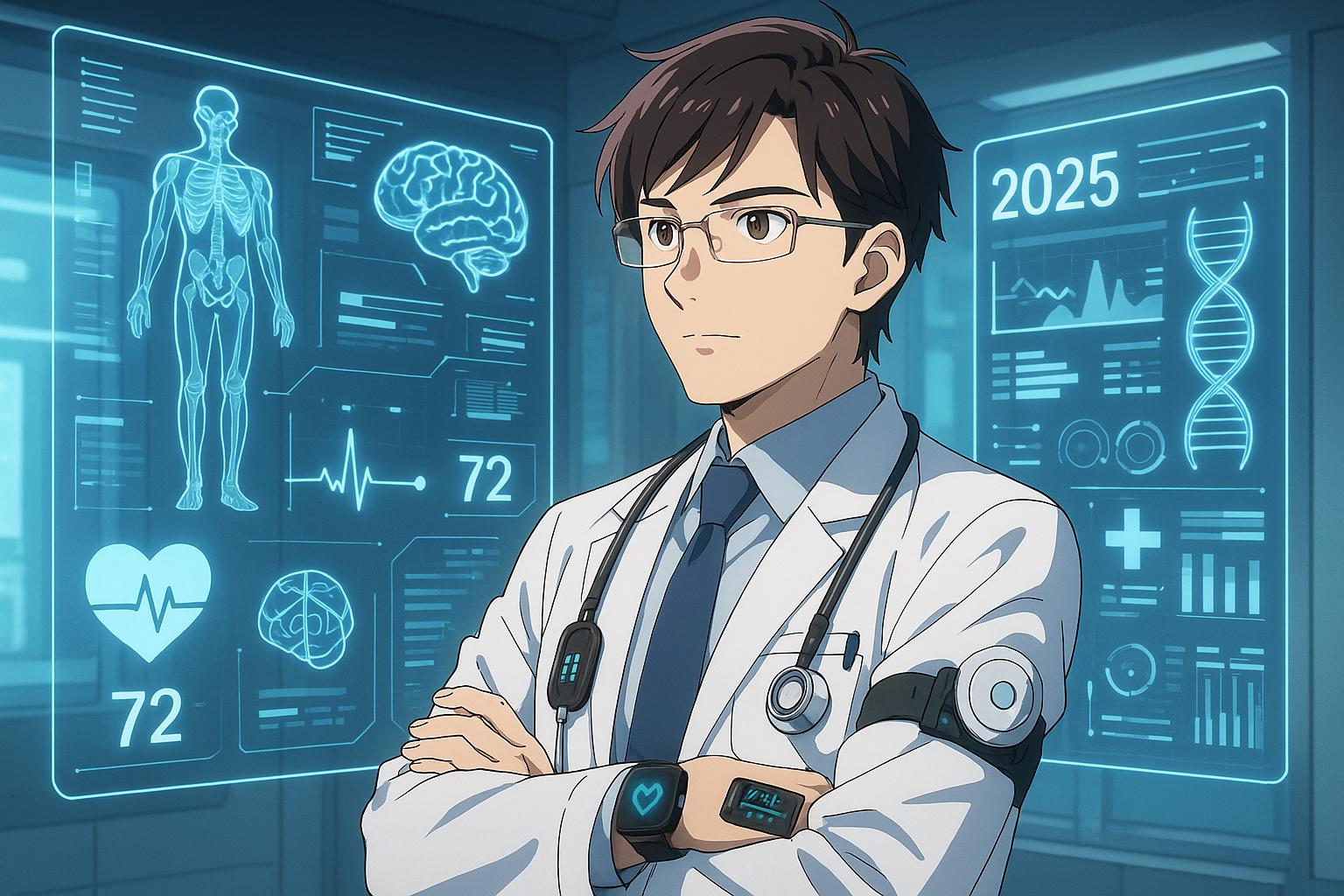As 2025 approaches, advancements in AI diagnostics and biohacking are transforming healthcare delivery and patient empowerment. However, these rapid innovations raise critical concerns about data privacy, algorithmic bias, and ethical oversight that must be addressed to secure a responsible and equitable medical future.
The intersection of healthcare and technology is dramatically redefining patient care, diagnostics, and long-term health management as we advance into 2025. With innovations like wearable trackers and sophisticated artificial intelligence (AI) algorithms capable of analysing extensive datasets, traditional practices in medicine are yielding to a future of dynamic and intelligent systems that empower both patients and providers to make informed decisions.
AI is increasingly becoming a vital partner for healthcare professionals rather than a substitute. It has proven adept at unveiling patterns in medical data that often elude human observation, thereby facilitating faster and more precise diagnoses. Developments in AI-enabled diagnostics are transforming numerous healthcare sectors. For example, tools such as IBM Watson Health in oncology and Aidoc in radiology help clinicians make critical decisions with unprecedented speed and accuracy. According to a recent study from Peking University, AI systems utilizing thermal imaging can even detect chronic conditions like diabetes from subtle facial temperature variations, reflecting a growing trend toward predictive and personalised healthcare.
These innovations are reshaping hospital protocols, enabling AI to assist not just in emergency situations but also during routine check-ups. Radiologists, for instance, can now focus on more complex cases, while general practitioners are assisted in identifying at-risk patients sooner, thus streamlining the healthcare workflow and potentially reducing misdiagnosis rates. However, experts caution that while AI’s integration into diagnostics is promising, concerns remain regarding the quality of data input and representation, particularly when diversity is lacking in the datasets used to train these algorithms.
Biohacking, a term that once conjured up images of fringe experiments, is now gaining mainstream traction as individuals leverage new technologies to optimise their health and well-being. The practices within biohacking have evolved and diversified. Current methods range from intermittent fasting and nootropic usage to advanced sleep optimisation techniques involving smart devices. Influential figures such as Bryan Johnson, an entrepreneur advocating for radical anti-aging regimens, underscore a cultural shift towards self-optimisation, albeit without universal scientific endorsement for every method he promotes. Innovations in biohacking are not just limited to individual experimentation; they are steadily making their way into popular wellness practices, raising questions about the ethics and long-term efficacy of these approaches.
Multiple start-ups are advancing this innovative landscape, devising solutions that address healthcare challenges from rural patient access to chronic disease management. Notable examples include Corti, which uses real-time voice recognition to detect heart attacks during emergency calls, and Babylon Health, which combines AI chatbots with real physicians for on-demand consultations. These companies are not merely innovating; they are attracting substantial venture capital and forming partnerships with hospitals and insurers to improve patient outcomes while driving down costs.
Yet, as these technological advancements proliferate, so too do concerns surrounding data privacy and the ethical implications of such rapid innovation. The necessity for vast amounts of personal data to train AI algorithms raises significant issues. Patients are increasingly vocal about the need for transparency regarding how their biometric data is used and shared. Furthermore, the potential for bias in AI systems, where algorithms trained predominantly on specific demographics may falter in diverse populations, remains a critical challenge.
In summary, the medical landscape of 2025 is characterised by a convergence of advanced technology, individual agency in health management, and the flourishing of innovative start-ups. As the industry grows, it promises improved health outcomes and faster intervention capabilities. However, these advancements necessitate vigilant oversight to ensure ethical practices become as integral to healthcare technology as the innovations themselves. The future of medicine will not only reflect what can be achieved through technology but also how these tools are responsibly integrated into the fabric of patient care.
 Reference Map:
Reference Map:
- Paragraph 1 – [1], [4]
- Paragraph 2 – [1], [2], [5]
- Paragraph 3 – [3], [6]
- Paragraph 4 – [1], [6], [7]
- Paragraph 5 – [1], [4]
- Paragraph 6 – [1], [6]
- Paragraph 7 – [1], [3]
Source: Noah Wire Services
- https://www.fingerlakes1.com/2025/06/09/new-technologies-in-medicine-ai-diagnostics-biohacking-and-start-ups/ – Please view link – unable to able to access data
- https://www.axios.com/2024/07/03/ai-disease-diagnostic-tests – Advancements in artificial intelligence (AI) are significantly enhancing the early detection of diseases through diagnostic tests. Traditional diagnostics often rely on known biological markers or the expertise of clinicians to be effective. However, AI-driven diagnostics can analyze vast amounts of data to uncover patterns that might be missed by human analysis. A recent study by researchers from Peking University demonstrated that AI, using thermal cameras to detect facial temperature patterns, can identify chronic illnesses such as diabetes and high blood pressure. These developments in AI are making diagnostics more personalized, predictive, and prescriptive. Although there are concerns about data quality and representation, the integration of AI in routine testing promises to provide patients with more comprehensive health information. This progress underscores the shift in medical practice toward using AI as an augmentative tool rather than replacing clinicians.
- https://www.ft.com/content/46d56221-f718-4873-ba52-3e424a786905 – Bryan Johnson, a multimillionaire entrepreneur who sold his company Braintree to PayPal for $800 million, has become a leading figure in Silicon Valley’s biohacking movement, aiming to defy aging and prolong life. Promoting his “Don’t Die” philosophy, he has garnered a large social media following and is the subject of a new Netflix documentary. Johnson, 47, has experimented with various extreme anti-aging regimens, including early morning routines, oxygen therapy, prolonged fasting, gene therapy, and even injecting his teenage son’s blood. While some lifestyle factors like a Mediterranean diet, regular exercise, sufficient sleep, and social interaction are scientifically proven to support longevity, many of Johnson’s methods lack scientific validation or regulatory approval. His journey raises the question of whether biohacking could be a real answer to achieving eternal life or if it is simply a misguided pursuit. Readers are invited to share their opinions in a poll or the comment section.
- https://www.forbes.com/councils/forbesbusinesscouncil/2025/03/12/the-next-frontier-of-biohacking-five-trends-poised-to-redefine-health-and-longevity/ – Biohacking is no longer the domain of fringe enthusiasts. Today, it’s a global movement driving advancements in health and longevity. Cutting-edge innovations are transforming how people approach wellness, enabling individuals to optimize performance, enhance recovery and prevent disease. Over the next decade, five breakthrough trends are set to reshape the health landscape and unlock unprecedented potential for human optimization. These trends include personalized medicine, nanotechnology, stem cell therapies, cognitive optimization, and metabolic optimization. As these technologies evolve, they are transitioning from niche adoption to mainstream influence, offering unprecedented opportunities for brands to connect with consumers on a deeper level. Understanding and leveraging these advancements will be key to staying ahead.
- https://www.mdpi.com/2075-4418/13/4/688 – Artificial intelligence (AI) has entered the medical field not as a replacement for physicians but as a powerful partner. Algorithms trained on vast datasets can detect patterns invisible to the human eye, offering faster and often more accurate diagnoses. AI tools are changing the diagnostic landscape in various areas, including oncology, pathology, radiology, and eye disease detection. Hospitals are deploying AI not only in emergency rooms but also in routine check-ups, allowing radiologists to focus on complex cases, speeding up lab results, and assisting general practitioners in flagging at-risk patients earlier than before. While the technology is still evolving, it’s already easing workload pressure and cutting misdiagnosis rates.
- https://www.mdpi.com/2075-4418/14/12/1265 – Artificial intelligence (AI) has entered the medical field not as a replacement for physicians but as a powerful partner. Algorithms trained on vast datasets can detect patterns invisible to the human eye, offering faster and often more accurate diagnoses. AI tools are changing the diagnostic landscape in various areas, including oncology, pathology, radiology, and eye disease detection. Hospitals are deploying AI not only in emergency rooms but also in routine check-ups, allowing radiologists to focus on complex cases, speeding up lab results, and assisting general practitioners in flagging at-risk patients earlier than before. While the technology is still evolving, it’s already easing workload pressure and cutting misdiagnosis rates.
- https://www.mdpi.com/journal/diagnostics/special_issues/906S061D3S – Artificial intelligence (AI) has entered the medical field not as a replacement for physicians but as a powerful partner. Algorithms trained on vast datasets can detect patterns invisible to the human eye, offering faster and often more accurate diagnoses. AI tools are changing the diagnostic landscape in various areas, including oncology, pathology, radiology, and eye disease detection. Hospitals are deploying AI not only in emergency rooms but also in routine check-ups, allowing radiologists to focus on complex cases, speeding up lab results, and assisting general practitioners in flagging at-risk patients earlier than before. While the technology is still evolving, it’s already easing workload pressure and cutting misdiagnosis rates.













